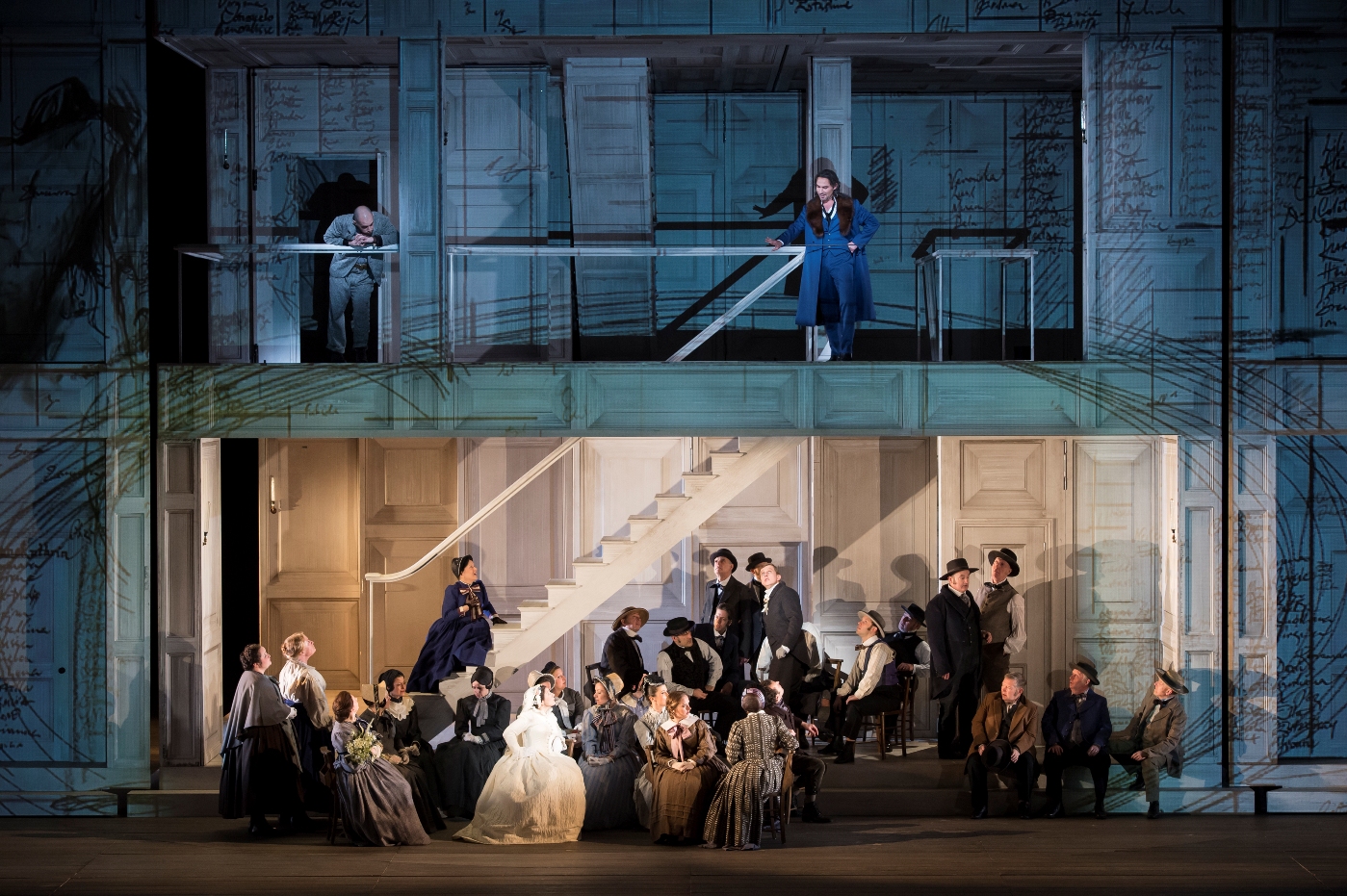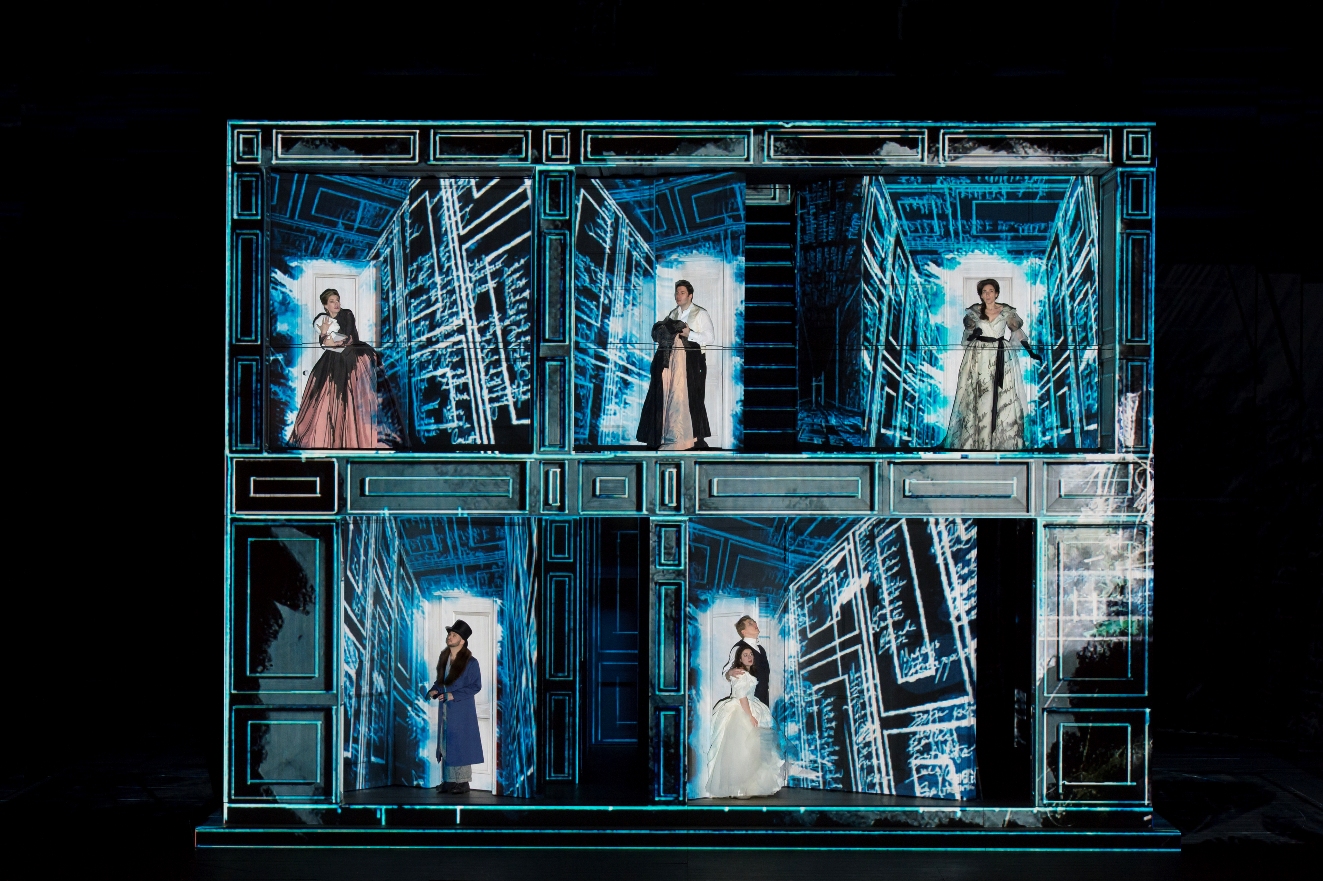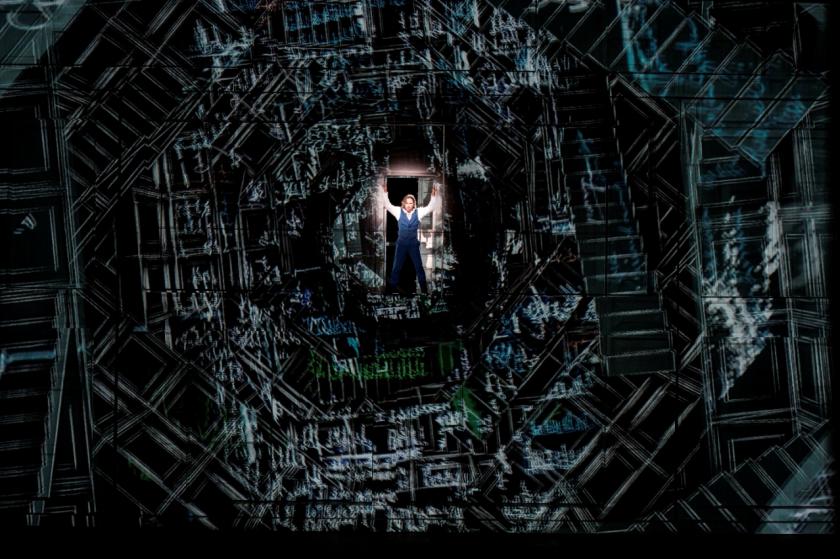If you don’t believe in the angels, or at least the good, of Don Giovanni, don’t stage it. Mozart may well be telling us, as Kasper Holten partly seems to be, that the antihero is a void, a mask-wearer and a creature of thrusting appetites, on his way to the abyss. But he also gives the young avengers, bent on punishing the libertine for his murder of Donna Anna’s father, music of such diamond-cut beauty that only someone bent on the text alone would ignore its force (whether we happen to be more compelled, dramatically speaking, by the rake’s enigma is irrelevant). To shed all but the last of the final six minutes, sung behind the impenetrable wall which shuts off the protagonist from an already unreal world, isn’t an option – least of all when you have six fine singers to make it work.
Holten starts unacceptably, too, in my books: whatever went on behind the door between Giovanni and Anna – and I see no reason, along with Deborah Warner whose Glyndebourne production remains a benchmark for me, why Anna should be lying about attempted rape – the music’s vital energy doesn’t tie in with post-coital contentment. Everything that happens between that and the no-hell-for-the-antihero in this production has moments of insight and always looks good as Luke Hall’s endlessly resourceful video projections illuminate the centre-stage revolving rectangle crucial to Es Devlin’s designs. But it hovers uneasily between realism – including a messy Act One party finale – and brainsick fantasy (the realm of Act Two).
 There’s the usual problem of over-design in that the characters and their relationships are dwarfed by the psycho-visuals – a problem which may be partially solved in the livescreening. This is the sort of thing that only La Fura des Baus can get away with, and then only under special circumstances (Tristan und Isolde in Lyon, Le Grand Macabre at ENO). Why diminish Mariusz Kwiecień (pictured above with Malin Byström's Donna Anna), possibly the best singer-actor available for the impossible protagonist’s role, in this way? He’s handsome and charismatic and can sing the first three and a half bars of “Là ci darem la mano” in a single seductive line – a blandishment replicated elsewhere, under the supportive baton of Nicola Luisotti, that Malin Byström’s Donna Anna and Antonio Poli’s Don Ottavio replicate elsewhere.
There’s the usual problem of over-design in that the characters and their relationships are dwarfed by the psycho-visuals – a problem which may be partially solved in the livescreening. This is the sort of thing that only La Fura des Baus can get away with, and then only under special circumstances (Tristan und Isolde in Lyon, Le Grand Macabre at ENO). Why diminish Mariusz Kwiecień (pictured above with Malin Byström's Donna Anna), possibly the best singer-actor available for the impossible protagonist’s role, in this way? He’s handsome and charismatic and can sing the first three and a half bars of “Là ci darem la mano” in a single seductive line – a blandishment replicated elsewhere, under the supportive baton of Nicola Luisotti, that Malin Byström’s Donna Anna and Antonio Poli’s Don Ottavio replicate elsewhere.
 Yet Kwiecień pushes Giovanni’s manic-depressive final stages too far. Similarly Elizabeth Watts, vocally a dream Zerlina, flounces around dementedly from the start (the wedding scene pictured left) and there’s lots of unattractive rasping in trying-too-hard recitatives from Alex Esposito’s Leporello, whose Catalogue Aria is an apogee of unfunniness (though people laughed at the supertitles). Byström is even more of a vocal goddess than Watts, making the thrust of “Or sai che l’onore” absolutely thrilling even as Holten seems determined to expose it, along with the preceding narrative, as a lie, and Poli does Italianate honour to both his arias even if he can’t act and isn’t asked to.
Yet Kwiecień pushes Giovanni’s manic-depressive final stages too far. Similarly Elizabeth Watts, vocally a dream Zerlina, flounces around dementedly from the start (the wedding scene pictured left) and there’s lots of unattractive rasping in trying-too-hard recitatives from Alex Esposito’s Leporello, whose Catalogue Aria is an apogee of unfunniness (though people laughed at the supertitles). Byström is even more of a vocal goddess than Watts, making the thrust of “Or sai che l’onore” absolutely thrilling even as Holten seems determined to expose it, along with the preceding narrative, as a lie, and Poli does Italianate honour to both his arias even if he can’t act and isn’t asked to.
Only the glamorous Véronique Gens as a grand Elvira falters slightly at her final hurdle. “Mi tradì”, which from a purist’s point of view needn’t appear - along with "Dalla sua pace" it was an inspired addition to the Vienna production after the Prague premiere - can’t flow as limpidly as it should given Gens' fast vibrato which activates her character elsewhere. The alternative recitative before it, which I hadn't heard before, is at least no less moving than the more familiar one. Dawid Kimberg's Masetto is, as often, a bit of a cipher and Alexander Tsymbalyuk's Commendatore bleats too much to terrify as the stone guest.

Luisotti’s fortepiano recit accompaniments are either flamboyant or self-indulgent, according to taste, but he mostly has the right fingers on the pulse of the score. Unfortunately the orchestra sounded dullish from where I was sitting: blame the stalls circle overhang which affects the acoustic impression from the second row back. But I couldn’t succumb to passing enchantments given what Holten was up to, or not.
His production is certainly an improvement on the last at the Royal Opera, Zambello’s vulgar waxworks show, and it has its moments – not least a giddying realisation of the great Act Two Sextet (pictured above) and a romantic ache expressed by this Giovanni when enviously watching Zerlina and Masetto in love or showing up in Anna’s last aria (this Ottavio, as too often, never stood a chance). But given that I was in the minority who believed in the human heart of Holten’s Tchaikovsky Eugene Onegin – and it works even better on DVD – this came as a hellish descent.















Add comment